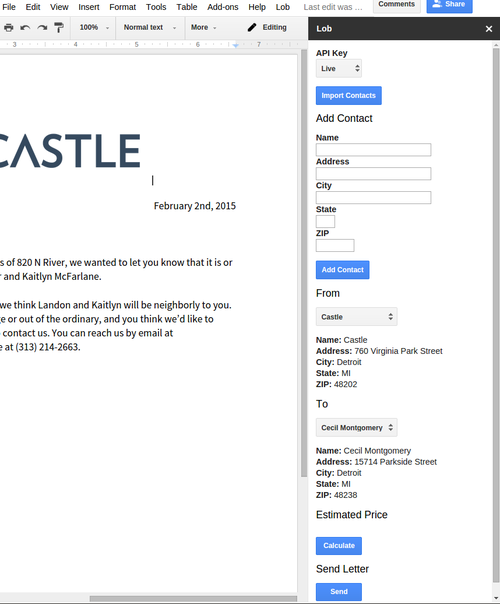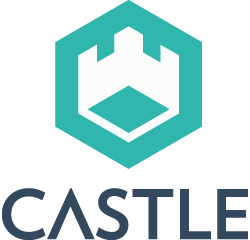Introducing Ledgers in the Castle App
Today, we’re rolling out a feature that moves ledgers into the Castle app. (Previously, we’ve been piggybacking on top of Google Sheets.)
You won’t notice too many changes just now: ledgers work the same as they always did, with the ability to sort by column, view relevant documents and maintenance issues, and download your data in CSV format. However, this change lays the groundwork for us to build some awesome new features into the ledgers going forward.
You can find ledgers for all your units in the brand-new “Ledgers” section in the sidebar of your account. Let us know if you have any questions. As always, we welcome your feedback and suggestions!
De-troit Basket-Ball
Growing up I always felt like I had a real connection with Detroit because I couldn’t get enough of John Mason, the Pistons PA announcer. Nothing rolls off the tongue quite like ‘DE-TROIT BASKET-BALL’. Each time I would hear that when I was watching a game I would get so fired up, even though I was always rooting for my hometown Denver Nuggets.
That being said, I’m writing this blog post to you, our dedicated fan and reader of our blog, letting you know that I’m the newest member of the Castle team! I come to Detroit by way of Boulder CO, Norman OK, Las Vegas NV, and Providence RI where I was most recently working for a company called Swipely trying to figure out how to fix the broken and archaic world of credit card processing. If you read the previous sentence and thought “Hmmm… Swipely and Castle both hang out in these weird old industries” you’re absolutely right, which is one of the main reasons I’m thrilled to have landed in Detroit.
There were two main draws for me moving out here to Detroit, and unfortunately, neither had anything to do with the weather1.
- People from Detroit are damn proud of their city: I’ve been fortunate to live in quite a few cities in the last 8 years and most of them lack an energy around their city’s history and culture through good times and bad. I probably wouldn’t have understood this concept had it not been for my experience living in Las Vegas for two years. In many ways, the cities are very similar. To an outsider, both cities seem like one trick ponies, gambling in Las Vegas and automotive manufacturing in Detroit, and both cities were some of the hardest hit during the housing crisis in 2008. I think the best word to describe both cities and the people that live in them is gritty, and by having that trait, each city is finding unique ways to bounce back and take the next step. I’m excited to be a part of, and contribute to, the hustle and grit that make Detroit what it is.
- Someone should fix old and broken industries: Just because a status quo has existed for decades, doesn’t mean it’s the right way to do things, nor does it mean that it’s the most convenient for the consumer. Take Warby Parker for example: Problem - Glasses used to cost $300 and you had to go to your optometrist to buy them. Solution - Glasses cost $99, the frames are shipped to you, if you like them great, and if you don’t no problem just ship them back. To me, property management isn’t that different. Let’s say you’re a property owner, you’re busy, and you want someone to look after this incredible asset of yours. Unfortunately, the company that manages your property has a complicated fee structure, has little to no transparency, and struggles to respond to your inquiries. I love what’s Castle is doing because we’re working hard everyday to fix what’s broken in this industry, and we’re doing it in a way that scales to lots and lots of cities.
Long story short, I’m pumped to have the opportunity to help Castle grow, I’m thrilled to be a part of the vibrant community here in Detroit, and I’m grateful that I’m no longer driving across the country with my cat riding shotgun.
- Fun fact: I went to the University of Oklahoma with the intention of becoming a broadcast meteorologist. The dream died the first and only time I went storm chasing, driving 700 miles through Texas and not seeing a thing (however, if you dig storm chasing check out this site for the best live chases on the web). ↩
Introducing the Applicants Tab
At Castle, our goal is to be the world’s most transparent property management company. Today, we’re rolling out an update that gets us one step closer to making that goal a reality.
The Castle app already offers a detailed window into your property’s maintenance issues and finances, but one piece of feedback we’ve heard repeatedly is that when a property is on the market, the picture of what’s going on is much vaguer. For many owners, the period in between when a property is listed and when it’s tenanted can feel like a black box.
With the new Applicants tab, we’re changing that. Starting today, when a property is on the market, you’ll be able to see a full breakdown of the applicants the property has received.

If a property isn’t renting as fast as you’d like, you’ll be able to get a better picture as to why. Maybe a lot of people are interested, but few are qualified. Or maybe many interested applicants failed to respond to our follow-up after a showing.
We look forward to giving you an even better look into your properties with the new Applicants tab, and as always, we welcome your feedback.
Don’t Call It a Comeback
Before I explain the reason behind the LL Cool J reference, I’d like to introduce myself. My name is Sid Nutulapati, and I have the privilege to be living and working in 760 Virginia Park with the Castle crew this summer. More specifically, I’ll be working under Scott to help build the app that Castle provides. I like to think of myself as an Apprentice, although the job description says Squire. That’s not to say that I won’t be working with Max and Tim; I’ll just be spending the majority of time with Scott, given that I’m a computer science major.
All the stories I’ve heard about Detroit are about its declining manufacturing industry, the dilapidated state of its buildings, rampant crime, and the inability of the Lions to win a football game in 2008. It’s not the stereotypical place for a college kid to spend a summer. In fact, when I tell my friends about my summer plans, I’m usually met with quizzical stares. “Why would you go to Detroit? There’s nothing there! You’re going to get stabbed or something!”

What my friends picture when I say I’m living in a house in Detroit.
But you see, I don’t think it’s as terrible a place as the “ruin porn” suggests. Detroit is on the upswing—businesses are growing, people are making more money, and for the first time since the recession of ‘08, the housing market is up. The Motor City has been injected with hope.
I believe in the tenacity of this city. At the risk of sounding too much like Clint Eastwood, all Detroit needs is grit, guts, and a fuel tank full of American ingenuity. I believe that the crime, the poverty, the dismal state of municipal finances—nearly all of the issues that plague Detroit today—can be solved by smart, hardworking indiviuals implementing novel ideas for the betterment of the community.
Castle embodies that mindset. That’s why I’m incredibly exited to be working here this summer. To work at a place where everyone around me has the mental horsepower to bring their vision to reality and drive each other to perform better? How crazy awesome is that?!
So why the LL Cool J? Detroit’s not out. It may be down, but I wouldn’t underestimate the resilience of its people. Don’t call it a comeback.
The Deck We Used to Raise Our $270k Angel Round
We’re exicted to announce that earlier this month, Castle closed a fundraising round of $270,000 from a fantastic group of angel investors.
Raising money is hard, and for first-time founders like us, it can be even harder. Throughout our fundraising process, which lasted around five months, one thing that was especially helpful to me was looking at other companies’ pitch decks.
But aside from a few prominent examples, finding pitch decks can be really hard. Early on in our process, I was inspired by another deck to completely redo an early version of ours. But I only saw that deck because one of that company’s investors shared it with me privately.
We think this is a shame. So, in the spirit of transparency, we’re sharing the deck we used to raise our angel round. We hope it can be as helpful to other founders as seeing others’ decks was to us.
Questions? Comments? I’d love to hear from you. Email me at [email protected].
Team First
After college, I joined Venture for America with a singular purpose: learning how to build a business. I knew my hands-on experience in the trenches at a startup would be invaluable when the time came to start my own.
During my fellowship, I focused my talents on building software because I had a knack for it. Anyone with a technical degree does their fair share of math problems, but I spent years crunching numbers to calculate the next best move in card games. I loved math so much that my first business venture was doing math homework for lunch money in high school. Naturally, I was happy to find that coding is, much like physics, little more than problem solving through applied math, so I figured being the best developer I could be was the path of least resistance for adding value.

Nerd culture forever!
But as time went on, it became more and more apparent that business is all about people. Capacity to build a product or service is necessary to create a successful company, but in the wise words of Jim Collins1, leaders of great companies prioritize getting the right people on the bus above all else. Logically, this makes sense to me because the other major components of a startup—market and product—are ultimately derivatives of the individuals that make up the team. Castle was founded on this philosophy, and I’m confident we got it right.
Max and Tim are each titans in their own right.
Max is an eccentric critic whose ability to get shit done is unlike anyone I’ve ever met, and the man has superhuman reading powers. His unwavering focus is borderline intimidating, his loud personality makes him the perfect champion for Castle, and his unabashed criticism is the primary source of feedback with which we use to make our product, and ourselves, better.
Tim is a stoic scientist whose mind is so logical that he literally never fails to dismiss a false dichotomy when presented with one. His word is worth its weight in gold, his breadth and depth of knowledge are incredible, and his penchant for levity makes him a pleasure to be around—trust me, as cofounders of two companies we spend a lot of time together.
Of course there’s plenty left for us to learn, but one thing’s for sure: I’m proud to call these dudes my business partners.

If they sound like individuals you’d like to spend every waking hour with too, then you’re in luck because I’m willing to share. In fact, Castle is hiring!
:]
- Yes, I read cheesy business books like Good to Great in my spare time, what of it? ↩
Glob: The Magic of Google Docs, APIs, and Open Source
A couple weeks ago, I had a problem: I wanted to send Google Docs through the mail. Specifically, I wanted to send physical copies of legal notices to our tenants.
I had pieces of the puzzle already in place. The templates were in Google Docs, where I could edit them for the specifics of the situation (ex. name, address, date). The mail aspect worked through Lob, which takes a PDF, prints it, and sends it via USPS to any address you specify. I made the system work manually, but it was an obvious case of using humans to do work best suited for computers—the antithesis of the automated property management that Castle is working to achieve.
Like a good digital native, my first instinct was to Google exactly what I wanted. The second result was Glob, an ad-on for Google Docs that sends a doc to Lob using the latter’s API. Jackpot, right?
I sure thought so. As it turns out, though, the program had a couple serious bugs, and there hadn’t been any development in two months. Not exactly the silver bullet I was looking for.
Here’s where the magic of open source and GitHub come in. Instead of moping about my best hope being a mere mirage in the desert of search results, I resolved to fix the bugs myself. I forked the original repo, made the changes I needed, and pushed the results.1 Now I had a solution I could share with the world! I encourage you to check it out, use it, and report any issues you have through GitHub.

Glob in action
Reflecting on the process, I have three main takeaways:
- Google Apps Script, the scripting language for Google services like Gmail and Docs, is a casual hacker’s paradise.
- APIs are the secret sauce that makes the internet so great.
- Open source software is a gift to mankind.
Big thanks to Mike Steele, the original creator of Glob, for wading through the Google Apps Script and Lob API documentation and putting together the original working product. Thanks also to Scott, Castle co-founder and CTO, for answering my dumb questions and encouraging me to build things.
- I also accidentally pushed our Lob API keys, which is the internet equivalent of publishing your Social Security number in your company’s advertisements. Thankfully, API keys are easy to regenerate.↩
Optimizing for Learning
“So, how’s Castle going?”
I get asked this question all the time—by friends, family, acquaintances, strangers, and Tinder dates who Googled me before we met1—and I never know how to answer.
I procrastinated all morning, but a bunch of inbound sales leads came in without my doing any work, so we gained three customers even though I wasted half my day. Good or bad?
An investor told me he’s not interested in our business, but he wants to support us personally, so he’s investing anyway. Good or bad?
We signed some new customers and made some great improvements to the product, but I’m filled with a horrible sense of free-floating anxiety for reasons I don’t understand and can’t explain. Good or bad?

Free-floating anxiety, courtesy of the always-brilliant Garfield Minus Garfield
Most of the time, I can answer the question anyway. I just say “It’s going great.” Or “It’s challenging, but rewarding.” Or, “Everything’s fine, mom, now leave me alone!”
Still, the question begs another: how should we best measure our progress? Yes, we have metrics: new customers, movement on the product roadmap, owner satisfaction. But while those metrics help reveal how the business is going overall, they don’t say as much about how it’s going for me personally.
That’s why lately, my focus has been on optimizing for learning. Whether the tasks I spent my time on succeeded, failed, or hit somewhere in between, my week was a success if I came out knowing a whole lot more than I did when I went in.
Viewing my experiences through the lens of learning changes how I feel about them. Lost a customer? It’s okay, as long as we learned from our mistake. Gained ten customers? Celebrate all you want, but if we don’t know why we closed them, or how we can replicate that success going forward, it’s not much of an accomplishment.
I’ve learned more in 2014 than I have in any other year of my life by far. Here’s hoping—no, planning—to make that rate of learning even higher in 2015.
- I swear this actually happened. ↩
How My Creative Writing Background Prepared Me to Run a Startup
Q: What’s the difference between an English major and a large pizza?
A: A large pizza can feed a family of four.
I heard this joke all the time when I was in college. And it only got worse when I revealed that my concentration was creative writing. As if being an English major wasn’t enough, I had to spend all my time doing… well, what is it exactly that creative writing students actually do?

If your family is anything like mine, you actually need more than one large pizza to feed them.
I didn’t become a creative writing major with the intention of getting a creative writing job (whatever that is) after college. My school wasn’t very career-focused, and I figured I’d spend my college years doing whatever I enjoyed doing, then figure out the rest later1.
And for a the first couple years, I did just that. I had a few opportunities to use my English chops writing marketing copy and press releases at my first job, but there weren’t any moments that made me say “Thank God I’m an English major.”

A classic from For Lack of a Better Comic
Then I started Castle.
As CEO, I spend most of my day doing exactly what I practiced during all those late writing nights: storytelling. My job is to communicate the story of Castle to customers, to investors, and to the team. In fact, almost everything I do involves storytelling:
- Sales (stories sell, features don’t)
- Web design (start with the words)
- Interface design (copywriting is interface design)
- Fundraising (investors back the company you can become, not the company you are now)
- And, of course, hiring.
You could even argue that our financial projections are a form of storytelling2. Yes, they’re a bunch of numbers, but those numbers tell our story for the next year: how much business we plan to do, how many people we plan to hire, and how much we plan to spend on yachts.

Just kidding.
So while I’m not going to get a business card reading “Chief Storyteller” anytime soon, those trusty old writing skills have served me very well with Castle so far. My English degree may not be feeding a family of four anytime soon—but it’s done a pretty good job feeding a founding team of three.
- Apparently my attitude isn’t very common: English, like the rest of the humanities, has been steadily declining as a major for several decades. ↩
- Any seasoned entrepreneur will tell you that they’re definitely fiction. ↩
Michigan’s Foreclosure Redemption Laws and You
While the foreclosure crisis is largely in the past, foreclosure auctions are still a great way to obtain new investment properties at below-market prices. If you’re buying foreclosed property in Michigan, there are some new laws on the books that could save you from financial and emotional pain. On the flip side, if you are an owner whose property is entering foreclosure, the new laws in Michigan may help you hold on to your home.

Before we wade too far into the weeds, let’s clarify some terms:
Foreclosure is when a lender forces the sale of a borrower’s assets to cover a debt the borrower owes but can no longer pay. The most common example is a home foreclosure, where a bank forces the sale via auction of a borrower’s house, to cover an unpaid mortgage.
Redemption is when a borrower pays an amount equal to the highest bid at the foreclosure auction, plus interest and fees, thus regaining the auctioned assets. Redemption allows the foreclosed-upon owner to buy his property back before it is officially sold to the auction winner. The period between the auction and the transfer of the assets to the auction winner is the redemption period.
In Michigan, the redemption period for a foreclosed piece of real estate varies depending on the property in question. There are four cases:
- Abandoned property: one month
- Property with more than two-thirds of debt still owed: six months
- Property with less than two-thirds of debt still owed: twelve months
- Agricultural property: twelve months
Note that the above rules apply to properties with no more than four units. Residential property must be smaller than three acres, while agricultural property must be larger than three acres.
Note also that a foreclosed owner may occupy his foreclosed property until the redemption period ends. Any experienced real estate investor can spot the problem here: a tenant with nothing to lose and no intention to redeem has six months or more to strip all valuables from his foreclosed property. Since the property is still his until the end of the redemption period, the highest bidder at the auction has no choice but to sit and watch the foreclosed owner plunders the house.
So far, everything covered is part of Michigan’s Revised Judicature Act of 1961. Effective January 10th, 2014, Public Act 104 of 2013 amends and revises the RJA to help prevent house stripping by foreclosed owners. Specifically, the winning bidder has the right to inspect the house inside and out during the redemption period.
The law lists further specifics about the inspections, but here’s the upside: if the winning bidder finds damages to the property during an inspection, he can sue the foreclosed owner for possession of the property. Again, the law lists specifics about what constitutes damage. Further, I’m not giving legal advice, and you should always consult your attorney before taking legal action. However, I believe it’s important that everyone in the foreclosure process knows their rights.
At Castle, we take pride in being real estate experts. We’re always looking for new topics to address, so email us at [email protected] with any subject you’d like to see us write about.
